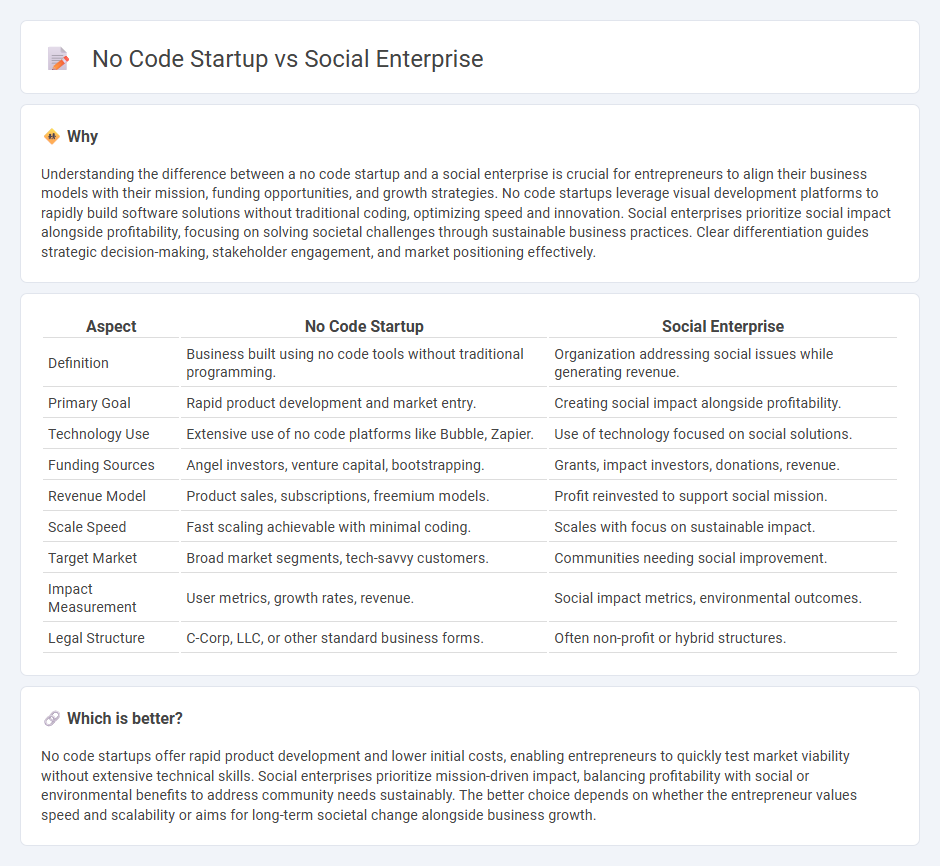
No-code startups leverage visual development platforms to quickly build and launch digital products without traditional programming, enabling rapid innovation and lower entry barriers. Social enterprises focus on addressing social or environmental challenges, balancing profit with purpose to create sustainable impact. Explore how these entrepreneurial models drive change and innovation in today's business landscape.
Why it is important
Understanding the difference between a no code startup and a social enterprise is crucial for entrepreneurs to align their business models with their mission, funding opportunities, and growth strategies. No code startups leverage visual development platforms to rapidly build software solutions without traditional coding, optimizing speed and innovation. Social enterprises prioritize social impact alongside profitability, focusing on solving societal challenges through sustainable business practices. Clear differentiation guides strategic decision-making, stakeholder engagement, and market positioning effectively.
Comparison Table
| Aspect | No Code Startup | Social Enterprise |
|---|---|---|
| Definition | Business built using no code tools without traditional programming. | Organization addressing social issues while generating revenue. |
| Primary Goal | Rapid product development and market entry. | Creating social impact alongside profitability. |
| Technology Use | Extensive use of no code platforms like Bubble, Zapier. | Use of technology focused on social solutions. |
| Funding Sources | Angel investors, venture capital, bootstrapping. | Grants, impact investors, donations, revenue. |
| Revenue Model | Product sales, subscriptions, freemium models. | Profit reinvested to support social mission. |
| Scale Speed | Fast scaling achievable with minimal coding. | Scales with focus on sustainable impact. |
| Target Market | Broad market segments, tech-savvy customers. | Communities needing social improvement. |
| Impact Measurement | User metrics, growth rates, revenue. | Social impact metrics, environmental outcomes. |
| Legal Structure | C-Corp, LLC, or other standard business forms. | Often non-profit or hybrid structures. |
Which is better?
No code startups offer rapid product development and lower initial costs, enabling entrepreneurs to quickly test market viability without extensive technical skills. Social enterprises prioritize mission-driven impact, balancing profitability with social or environmental benefits to address community needs sustainably. The better choice depends on whether the entrepreneur values speed and scalability or aims for long-term societal change alongside business growth.
Connection
No-code startups empower social enterprises by enabling rapid, cost-effective development of digital solutions without extensive programming knowledge, accelerating their impact on social issues. This democratization of technology facilitates social entrepreneurs in creating scalable, innovative business models that address community needs while optimizing resource allocation. Leveraging no-code platforms enhances the agility and sustainability of social enterprises, driving inclusive economic growth and social innovation.
Key Terms
**Social Enterprise:**
Social enterprises prioritize social impact by addressing community challenges through sustainable business models, often reinvesting profits into their missions. Unlike no-code startups, which leverage technology platforms for rapid product development and scalability, social enterprises emphasize measurable social outcomes alongside financial viability. Explore the distinct benefits and strategies of social enterprises to understand their role in driving meaningful change.
Social Impact
Social enterprises prioritize social impact by addressing community challenges through sustainable business models, often reinvesting profits to solve societal issues such as poverty, education, and health. No code startups leverage technology platforms to rapidly develop applications without traditional coding, enabling quick solutions that can drive innovation and efficiency, though their primary focus may not always be social impact. Explore the distinct approaches and potential synergies between social enterprises and no code startups to maximize positive societal change.
Mission-Driven
Social enterprises prioritize solving societal challenges through sustainable business models, embedding social impact at the core of their mission, often measuring success by changes in community well-being or environmental health. No code startups leverage visual development platforms to rapidly create scalable technology solutions, emphasizing innovation, speed to market, and financial growth, with impact often secondary to product or market success. Discover how these frameworks uniquely align purpose with progress by exploring their mission-driven strategies in depth.
Source and External Links
Social enterprise - A social enterprise is an organization that applies commercial strategies to achieve social, environmental, and financial goals, reinvesting earnings to further its social mission and aiming for sustainability without relying solely on philanthropy.
What is a Social Enterprise? - Definition & Examples - Social enterprises prioritize social or environmental impact over profits by using entrepreneurial approaches to provide products, services, and employment to vulnerable populations, reinvesting profits to fulfill their social missions in sectors where markets have failed.
Setting up a social enterprise - In the UK, social enterprises are set up by choosing business structures such as limited companies, community interest companies (CICs), or cooperatives, all designed to benefit communities with legal requirements like community interest statements and asset locks to ensure social objectives are met.
 dowidth.com
dowidth.com